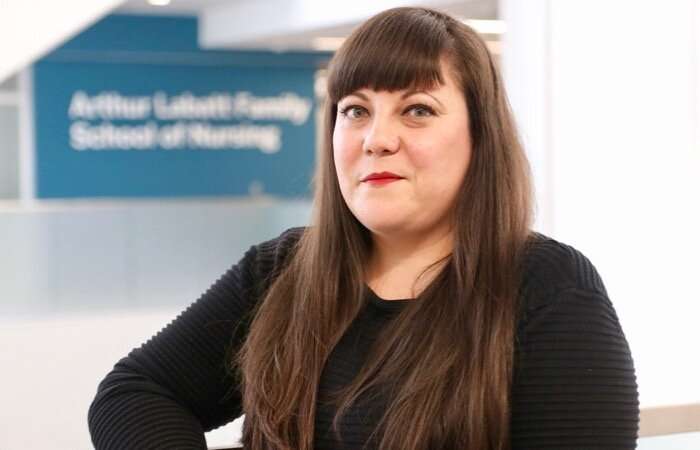Nursing professor Panagiota Tryphonopoulos looks to reconnect mothers with their young children, counteracting the critical parental bond lost due to the effects of postpartum depression. Credit: University of Western Ontario
Known as 'the thief that steals motherhood," postpartum depression (PPD) not only obstructs a mother's capacity for understanding and enjoying her baby, but puts children at risk for behavioral and cognitive problems.
While treating PPD itself doesn't always end up benefiting the mother/child relationship, Nursing professor Panagiota Tryphonopoulos is looking at ways to bolster this critical bond.
"Everybody experiences parenting differently. Think about how challenging it is to begin with—then throw the wrench of PPD into the mix," said Tryphonopoulos, noting as high 1-in-5 new mothers are affected by PPD. "People sometimes don't realize infants are capable communicators. They have these engagement and disengagement cues to bring mom in and say, "I'm here and ready to play. I'm having fun. I'm loving this. I love looking at your face and hearing your voice," or "I'm over stimulated or need a change." We need to give props to the babies for the skills they have."
Tryphonopoulos explores how these depressive symptoms essentially mask how mom understands and enjoys her baby. She is doing that through a program called VID-KIDS—short for Video-Feedback Interaction Guidance for Improving Interactions Between Depressed Mothers and Their Infants.
In the program, nurses record regular, everyday mother-child interactions. Afterward, they review the video with the mother. While moms are still the experts around what their babies need, Tryphonopoulos said, the idea is to offer additional tools to improve and strengthen the bond.
"We watch that video with mom, pointing out those engagement cues and showing her how much her baby is enjoying being with her and how much they light up when looking at her face," Tryphonopoulos added.
Tryphonopoulos describes it as a "serve and return" idea where nurses show mothers what the child is trying to say (serving) and how the mother responded.
"This video feedback intervention lets the moms know that even while babies can't speak they are sophisticated at communicating their wants and needs," Tryphonopoulos said. "We like to call it a 'positive parenting intervention' or 'strength-based parenting intervention.' We're really focusing in on those little snippets of interaction that indicate the baby is engaged, ready to play and having a great time with mom."
By improving interaction quality, depressed mothers may be motivated to engage in further play. Their infants, in turn, may be more likely to elicit positive, enjoyable experiences.
Infants can perceive PPD, triggering a stress hormone (cortisol) release which negatively affects developing their brains by decreasing its size.
"Children of depressed moms typically tend to maybe more fearful of strangers, more anxious, have more difficulty with emotional regulation and, later on in life, it may indicate a limited school readiness. Like a house, you need that good foundation architecture to begin—and then everything follows."
PPD is treatable with antidepressants, psychotherapy or peer support. But even if the symptoms are resolved, that damage done in the early mother-child bond may be locked in an unbreakable pattern.
Tryphonopoulos has taken her program to Hamilton where she trains nurses in its use in the Healthy Babies, Healthy Children program.
"As nurses, we're problem solvers. We want to do things to help you feel better. This is something that could be really, really promising for families struggling with things like depression," Tryphonopoulos said.
Provided by University of Western Ontario























